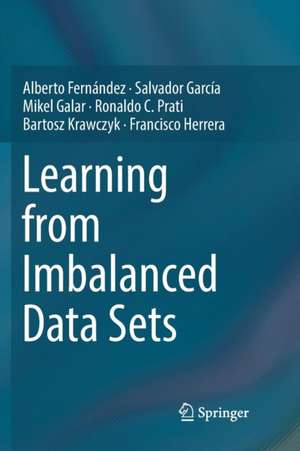Learning from Imbalanced Data Sets
Autor Alberto Fernández, Salvador García, Mikel Galar, Ronaldo C. Prati, Bartosz Krawczyk, Francisco Herreraen Limba Engleză Paperback – 19 ian 2019
This book stresses the gap with standard classification tasks by reviewing the case studies and ad-hoc performance metrics that are applied in this area. It also covers the different approaches that have been traditionally applied to address the binary skewed class distribution. Specifically, it reviews cost-sensitive learning, data-level preprocessing methods and algorithm-level solutions, taking also into account those ensemble-learning solutions that embed any of the former alternatives. Furthermore, it focuses on the extension of the problem for multi-class problems, where the former classical methods are no longer to be applied in a straightforward way. This book also focuses on the data intrinsic characteristics that are the main causes which, added to the uneven class distribution, truly hinders the performance of classification algorithms in this scenario. Then, some notes on data reduction are provided in order to understand the advantages related to the use of this type of approaches.
Finally this book introduces some novel areas of study that are gathering a deeper attention on the imbalanced data issue. Specifically, it considers the classification of data streams, non-classical classification problems, and the scalability related to Big Data. Examples of software libraries and modules to address imbalanced classification are provided.
This book is highly suitable for technical professionals, senior undergraduate and graduate students in the areas of data science, computer science and engineering. It will also be useful for scientists and researchers to gain insight on the current developments in this area of study, as well as future research directions.
| Toate formatele și edițiile | Preț | Express |
|---|---|---|
| Paperback (1) | 993.83 lei 6-8 săpt. | |
| Springer International Publishing – 19 ian 2019 | 993.83 lei 6-8 săpt. | |
| Hardback (1) | 999.39 lei 6-8 săpt. | |
| Springer International Publishing – noi 2018 | 999.39 lei 6-8 săpt. |
Preț: 993.83 lei
Preț vechi: 1242.28 lei
-20% Nou
Puncte Express: 1491
Preț estimativ în valută:
190.19€ • 198.31$ • 158.07£
190.19€ • 198.31$ • 158.07£
Carte tipărită la comandă
Livrare economică 21 martie-04 aprilie
Preluare comenzi: 021 569.72.76
Specificații
ISBN-13: 9783030074463
ISBN-10: 3030074463
Ilustrații: XVIII, 377 p. 71 illus., 50 illus. in color.
Dimensiuni: 155 x 235 mm
Greutate: 0.61 kg
Ediția:Softcover reprint of the original 1st ed. 2018
Editura: Springer International Publishing
Colecția Springer
Locul publicării:Cham, Switzerland
ISBN-10: 3030074463
Ilustrații: XVIII, 377 p. 71 illus., 50 illus. in color.
Dimensiuni: 155 x 235 mm
Greutate: 0.61 kg
Ediția:Softcover reprint of the original 1st ed. 2018
Editura: Springer International Publishing
Colecția Springer
Locul publicării:Cham, Switzerland
Cuprins
1 Introduction to KDD and Data Science.- 2 Foundations on Imbalanced Classification.- 3 Performance measures.- 4 Cost-sensitive Learning.- 5 Data Level Preprocessing Methods.- 6 Algorithm-level Approaches.- 7 Ensemble Learning.- 8 Imbalanced Classification with Multiple Classes.- 9 Dimensionality Reduction for Imbalanced Learning.- 10 Data Intrinsic Characteristics.- 11 Learning from Imbalanced Data Streams.- 12 Non-Classical Imbalanced Classification Problems.- 13 Imbalanced Classification for Big Data.- 14 Software and Libraries for Imbalanced Classification.
Caracteristici
Offers a comprehensive review of imbalanced learning widely used worldwide in many real applications, such as fraud detection, disease diagnosis, etc
Provides the user with the required background and software tools needed to deal with Imbalance data
Presents the latest advances in the field of learning with imbalanced data, including Big Data applications and non-classical problems, such as semi-supervised learning, multilabel and multi instance learning, and ordinal classification and regression
Includes case studies
Provides the user with the required background and software tools needed to deal with Imbalance data
Presents the latest advances in the field of learning with imbalanced data, including Big Data applications and non-classical problems, such as semi-supervised learning, multilabel and multi instance learning, and ordinal classification and regression
Includes case studies
